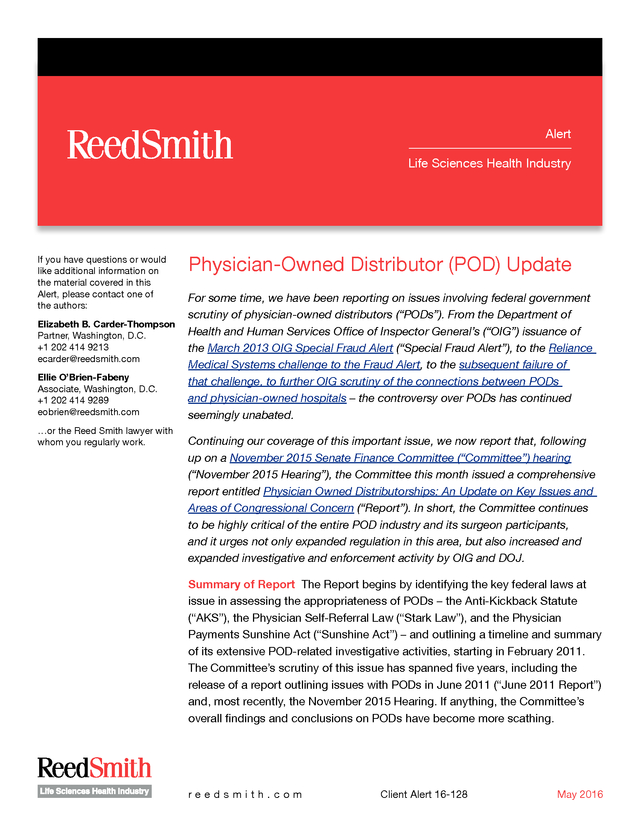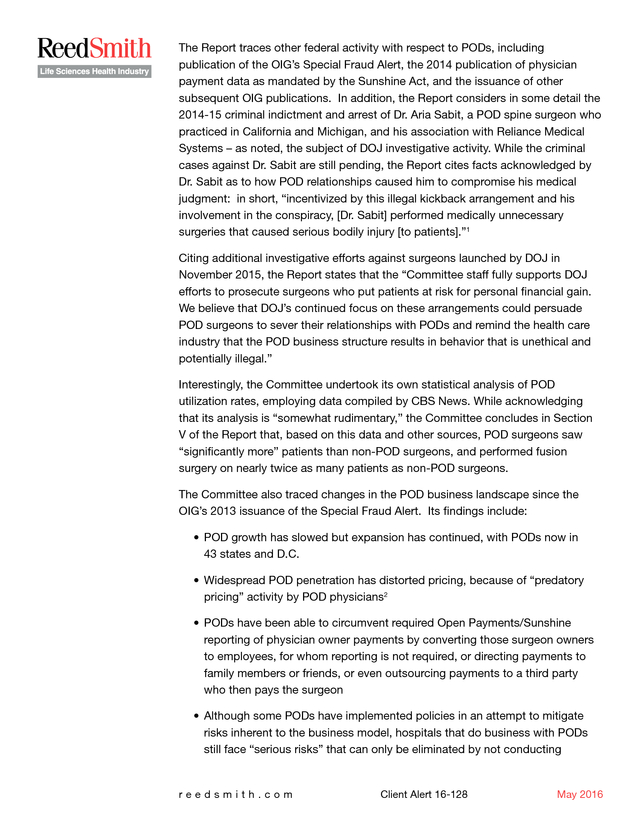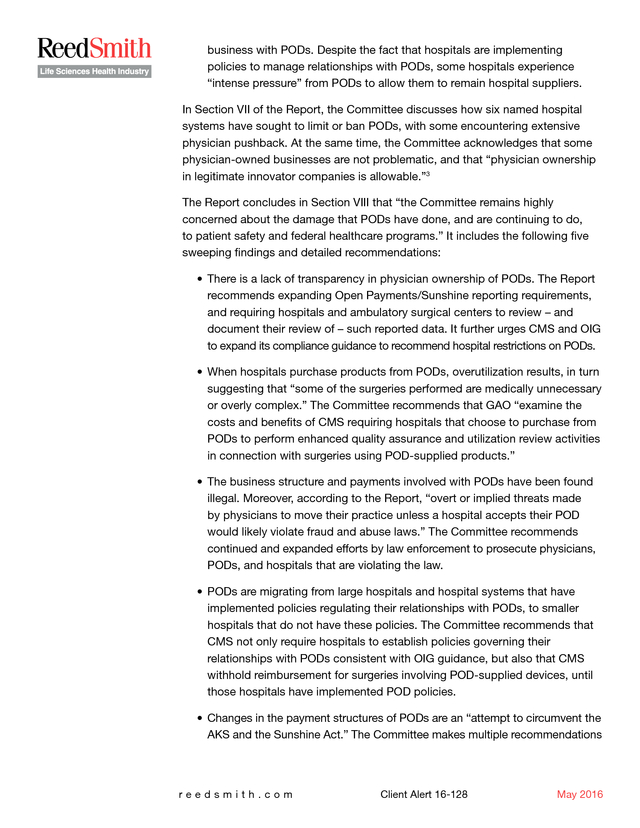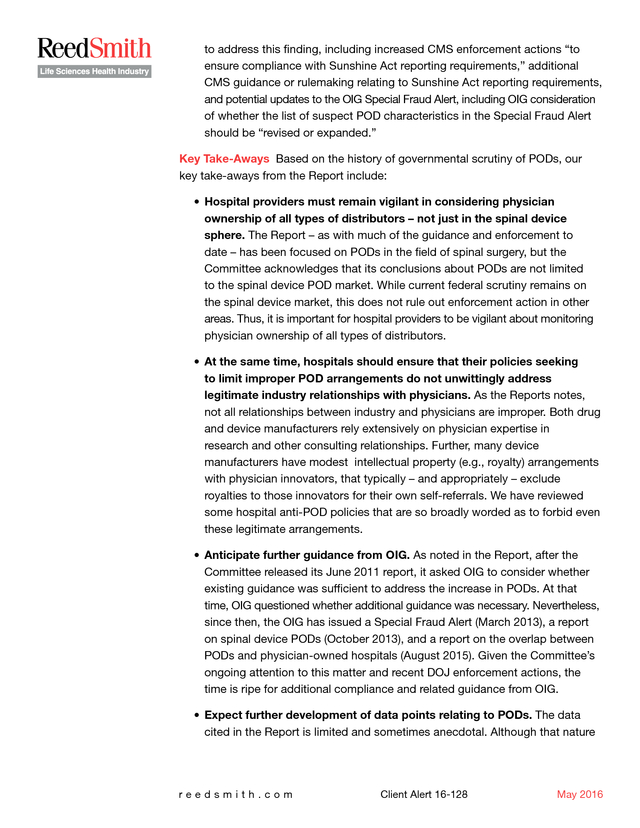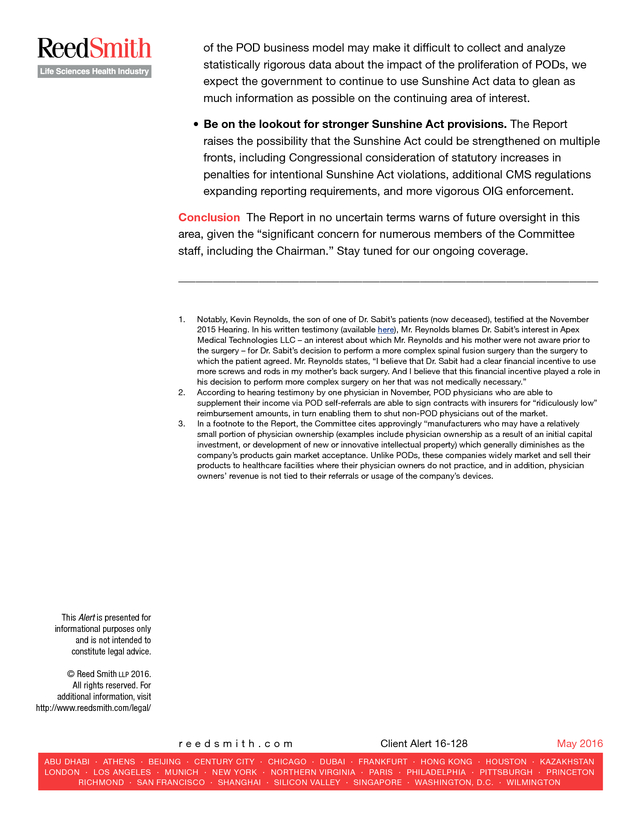Description
Alert
Life Sciences Health Industry
If you have questions or would
like additional information on
the material covered in this
Alert, please contact one of
the authors:
Elizabeth B. Carder-Thompson
Partner, Washington, D.C.
+1 202 414 9213
ecarder@reedsmith.com
Ellie O’Brien-Fabeny
Associate, Washington, D.C.
+1 202 414 9289
eobrien@reedsmith.com
…or the Reed Smith lawyer with
whom you regularly work.
Physician-Owned Distributor (POD) Update
For some time, we have been reporting on issues involving federal government
scrutiny of physician-owned distributors (“PODs”). From the Department of
Health and Human Services Office of Inspector General’s (“OIG”) issuance of
the March 2013 OIG Special Fraud Alert (“Special Fraud Alert”), to the Reliance
Medical Systems challenge to the Fraud Alert, to the subsequent failure of
that challenge, to further OIG scrutiny of the connections between PODs
and physician-owned hospitals – the controversy over PODs has continued
seemingly unabated.
Continuing our coverage of this important issue, we now report that, following
up on a November 2015 Senate Finance Committee (“Committee”) hearing
(“November 2015 Hearing”), the Committee this month issued a comprehensive
report entitled Physician Owned Distributorships: An Update on Key Issues and
Areas of Congressional Concern (“Report”). In short, the Committee continues
to be highly critical of the entire POD industry and its surgeon participants,
and it urges not only expanded regulation in this area, but also increased and
expanded investigative and enforcement activity by OIG and DOJ.
Summary of Report The Report begins by identifying the key federal laws at
issue in assessing the appropriateness of PODs – the Anti-Kickback Statute
(“AKS”), the Physician Self-Referral Law (“Stark Law”), and the Physician
Payments Sunshine Act (“Sunshine Act”) – and outlining a timeline and summary
of its extensive POD-related investigative activities, starting in February 2011.
The Committee’s scrutiny of this issue has spanned five years, including the
release of a report outlining issues with PODs in June 2011 (“June 2011 Report”)
and, most recently, the November 2015 Hearing.
If anything, the Committee’s overall findings and conclusions on PODs have become more scathing. reedsmith.com Client Alert 16-128 May 2016 . The Report traces other federal activity with respect to PODs, including publication of the OIG’s Special Fraud Alert, the 2014 publication of physician payment data as mandated by the Sunshine Act, and the issuance of other subsequent OIG publications. In addition, the Report considers in some detail the 2014-15 criminal indictment and arrest of Dr. Aria Sabit, a POD spine surgeon who practiced in California and Michigan, and his association with Reliance Medical Systems – as noted, the subject of DOJ investigative activity. While the criminal cases against Dr.
Sabit are still pending, the Report cites facts acknowledged by Dr. Sabit as to how POD relationships caused him to compromise his medical judgment: in short, “incentivized by this illegal kickback arrangement and his involvement in the conspiracy, [Dr. Sabit] performed medically unnecessary surgeries that caused serious bodily injury [to patients].”1 Citing additional investigative efforts against surgeons launched by DOJ in November 2015, the Report states that the “Committee staff fully supports DOJ efforts to prosecute surgeons who put patients at risk for personal financial gain. We believe that DOJ’s continued focus on these arrangements could persuade POD surgeons to sever their relationships with PODs and remind the health care industry that the POD business structure results in behavior that is unethical and potentially illegal.” Interestingly, the Committee undertook its own statistical analysis of POD utilization rates, employing data compiled by CBS News.
While acknowledging that its analysis is “somewhat rudimentary,” the Committee concludes in Section V of the Report that, based on this data and other sources, POD surgeons saw “significantly more” patients than non-POD surgeons, and performed fusion surgery on nearly twice as many patients as non-POD surgeons. The Committee also traced changes in the POD business landscape since the OIG’s 2013 issuance of the Special Fraud Alert. Its findings include: • POD growth has slowed but expansion has continued, with PODs now in 43 states and D.C. • Widespread POD penetration has distorted pricing, because of “predatory pricing” activity by POD physicians2 • PODs have been able to circumvent required Open Payments/Sunshine reporting of physician owner payments by converting those surgeon owners to employees, for whom reporting is not required, or directing payments to family members or friends, or even outsourcing payments to a third party who then pays the surgeon • Although some PODs have implemented policies in an attempt to mitigate risks inherent to the business model, hospitals that do business with PODs still face “serious risks” that can only be eliminated by not conducting reedsmith.com Client Alert 16-128 May 2016 . business with PODs. Despite the fact that hospitals are implementing policies to manage relationships with PODs, some hospitals experience “intense pressure” from PODs to allow them to remain hospital suppliers. In Section VII of the Report, the Committee discusses how six named hospital systems have sought to limit or ban PODs, with some encountering extensive physician pushback. At the same time, the Committee acknowledges that some physician-owned businesses are not problematic, and that “physician ownership in legitimate innovator companies is allowable.”3 The Report concludes in Section VIII that “the Committee remains highly concerned about the damage that PODs have done, and are continuing to do, to patient safety and federal healthcare programs.” It includes the following five sweeping findings and detailed recommendations: • There is a lack of transparency in physician ownership of PODs. The Report recommends expanding Open Payments/Sunshine reporting requirements, and requiring hospitals and ambulatory surgical centers to review – and document their review of – such reported data.
It further urges CMS and OIG to expand its compliance guidance to recommend hospital restrictions on PODs. • When hospitals purchase products from PODs, overutilization results, in turn suggesting that “some of the surgeries performed are medically unnecessary or overly complex.” The Committee recommends that GAO “examine the costs and benefits of CMS requiring hospitals that choose to purchase from PODs to perform enhanced quality assurance and utilization review activities in connection with surgeries using POD-supplied products.” • The business structure and payments involved with PODs have been found illegal. Moreover, according to the Report, “overt or implied threats made by physicians to move their practice unless a hospital accepts their POD would likely violate fraud and abuse laws.” The Committee recommends continued and expanded efforts by law enforcement to prosecute physicians, PODs, and hospitals that are violating the law. • PODs are migrating from large hospitals and hospital systems that have implemented policies regulating their relationships with PODs, to smaller hospitals that do not have these policies. The Committee recommends that CMS not only require hospitals to establish policies governing their relationships with PODs consistent with OIG guidance, but also that CMS withhold reimbursement for surgeries involving POD-supplied devices, until those hospitals have implemented POD policies. • Changes in the payment structures of PODs are an “attempt to circumvent the AKS and the Sunshine Act.” The Committee makes multiple recommendations reedsmith.com Client Alert 16-128 May 2016 .
to address this finding, including increased CMS enforcement actions “to ensure compliance with Sunshine Act reporting requirements,” additional CMS guidance or rulemaking relating to Sunshine Act reporting requirements, and potential updates to the OIG Special Fraud Alert, including OIG consideration of whether the list of suspect POD characteristics in the Special Fraud Alert should be “revised or expanded.” Key Take-Aways Based on the history of governmental scrutiny of PODs, our key take-aways from the Report include: • Hospital providers must remain vigilant in considering physician ownership of all types of distributors – not just in the spinal device sphere. The Report – as with much of the guidance and enforcement to date – has been focused on PODs in the field of spinal surgery, but the Committee acknowledges that its conclusions about PODs are not limited to the spinal device POD market. While current federal scrutiny remains on the spinal device market, this does not rule out enforcement action in other areas. Thus, it is important for hospital providers to be vigilant about monitoring physician ownership of all types of distributors. • At the same time, hospitals should ensure that their policies seeking to limit improper POD arrangements do not unwittingly address legitimate industry relationships with physicians.
As the Reports notes, not all relationships between industry and physicians are improper. Both drug and device manufacturers rely extensively on physician expertise in research and other consulting relationships. Further, many device manufacturers have modest intellectual property (e.g., royalty) arrangements with physician innovators, that typically – and appropriately – exclude royalties to those innovators for their own self-referrals.
We have reviewed some hospital anti-POD policies that are so broadly worded as to forbid even these legitimate arrangements. • Anticipate further guidance from OIG. As noted in the Report, after the Committee released its June 2011 report, it asked OIG to consider whether existing guidance was sufficient to address the increase in PODs. At that time, OIG questioned whether additional guidance was necessary.
Nevertheless, since then, the OIG has issued a Special Fraud Alert (March 2013), a report on spinal device PODs (October 2013), and a report on the overlap between PODs and physician-owned hospitals (August 2015). Given the Committee’s ongoing attention to this matter and recent DOJ enforcement actions, the time is ripe for additional compliance and related guidance from OIG. • Expect further development of data points relating to PODs. The data cited in the Report is limited and sometimes anecdotal.
Although that nature reedsmith.com Client Alert 16-128 May 2016 . of the POD business model may make it difficult to collect and analyze statistically rigorous data about the impact of the proliferation of PODs, we expect the government to continue to use Sunshine Act data to glean as much information as possible on the continuing area of interest. • Be on the lookout for stronger Sunshine Act provisions. The Report raises the possibility that the Sunshine Act could be strengthened on multiple fronts, including Congressional consideration of statutory increases in penalties for intentional Sunshine Act violations, additional CMS regulations expanding reporting requirements, and more vigorous OIG enforcement. Conclusion The Report in no uncertain terms warns of future oversight in this area, given the “significant concern for numerous members of the Committee staff, including the Chairman.” Stay tuned for our ongoing coverage. _________________________________________________________________________ 1. 2. 3. Notably, Kevin Reynolds, the son of one of Dr. Sabit’s patients (now deceased), testified at the November 2015 Hearing. In his written testimony (available here), Mr.
Reynolds blames Dr. Sabit’s interest in Apex Medical Technologies LLC – an interest about which Mr. Reynolds and his mother were not aware prior to the surgery – for Dr.
Sabit’s decision to perform a more complex spinal fusion surgery than the surgery to which the patient agreed. Mr. Reynolds states, “I believe that Dr.
Sabit had a clear financial incentive to use more screws and rods in my mother’s back surgery. And I believe that this financial incentive played a role in his decision to perform more complex surgery on her that was not medically necessary.” According to hearing testimony by one physician in November, POD physicians who are able to supplement their income via POD self-referrals are able to sign contracts with insurers for “ridiculously low” reimbursement amounts, in turn enabling them to shut non-POD physicians out of the market. In a footnote to the Report, the Committee cites approvingly “manufacturers who may have a relatively small portion of physician ownership (examples include physician ownership as a result of an initial capital investment, or development of new or innovative intellectual property) which generally diminishes as the company’s products gain market acceptance. Unlike PODs, these companies widely market and sell their products to healthcare facilities where their physician owners do not practice, and in addition, physician owners’ revenue is not tied to their referrals or usage of the company’s devices. This Alert is presented for informational purposes only and is not intended to constitute legal advice. © Reed Smith LLP 2016. All rights reserved.
For additional information, visit http://www.reedsmith.com/legal/ reedsmith.com Client Alert 16-128 May 2016 ABU DHABI · ATHENS · BEIJING · CENTURY CITY · CHICAGO · DUBAI · FRANKFURT · HONG KONG · HOUSTON · KAZAKHSTAN LONDON · LOS ANGELES · MUNICH · NEW YORK · NORTHERN VIRGINIA · PARIS · PHILADELPHIA · PITTSBURGH · PRINCETON RICHMOND · SAN FRANCISCO · SHANGHAI · SILICON VALLEY · SINGAPORE · WASHINGTON, D.C. · WILMINGTON .
If anything, the Committee’s overall findings and conclusions on PODs have become more scathing. reedsmith.com Client Alert 16-128 May 2016 . The Report traces other federal activity with respect to PODs, including publication of the OIG’s Special Fraud Alert, the 2014 publication of physician payment data as mandated by the Sunshine Act, and the issuance of other subsequent OIG publications. In addition, the Report considers in some detail the 2014-15 criminal indictment and arrest of Dr. Aria Sabit, a POD spine surgeon who practiced in California and Michigan, and his association with Reliance Medical Systems – as noted, the subject of DOJ investigative activity. While the criminal cases against Dr.
Sabit are still pending, the Report cites facts acknowledged by Dr. Sabit as to how POD relationships caused him to compromise his medical judgment: in short, “incentivized by this illegal kickback arrangement and his involvement in the conspiracy, [Dr. Sabit] performed medically unnecessary surgeries that caused serious bodily injury [to patients].”1 Citing additional investigative efforts against surgeons launched by DOJ in November 2015, the Report states that the “Committee staff fully supports DOJ efforts to prosecute surgeons who put patients at risk for personal financial gain. We believe that DOJ’s continued focus on these arrangements could persuade POD surgeons to sever their relationships with PODs and remind the health care industry that the POD business structure results in behavior that is unethical and potentially illegal.” Interestingly, the Committee undertook its own statistical analysis of POD utilization rates, employing data compiled by CBS News.
While acknowledging that its analysis is “somewhat rudimentary,” the Committee concludes in Section V of the Report that, based on this data and other sources, POD surgeons saw “significantly more” patients than non-POD surgeons, and performed fusion surgery on nearly twice as many patients as non-POD surgeons. The Committee also traced changes in the POD business landscape since the OIG’s 2013 issuance of the Special Fraud Alert. Its findings include: • POD growth has slowed but expansion has continued, with PODs now in 43 states and D.C. • Widespread POD penetration has distorted pricing, because of “predatory pricing” activity by POD physicians2 • PODs have been able to circumvent required Open Payments/Sunshine reporting of physician owner payments by converting those surgeon owners to employees, for whom reporting is not required, or directing payments to family members or friends, or even outsourcing payments to a third party who then pays the surgeon • Although some PODs have implemented policies in an attempt to mitigate risks inherent to the business model, hospitals that do business with PODs still face “serious risks” that can only be eliminated by not conducting reedsmith.com Client Alert 16-128 May 2016 . business with PODs. Despite the fact that hospitals are implementing policies to manage relationships with PODs, some hospitals experience “intense pressure” from PODs to allow them to remain hospital suppliers. In Section VII of the Report, the Committee discusses how six named hospital systems have sought to limit or ban PODs, with some encountering extensive physician pushback. At the same time, the Committee acknowledges that some physician-owned businesses are not problematic, and that “physician ownership in legitimate innovator companies is allowable.”3 The Report concludes in Section VIII that “the Committee remains highly concerned about the damage that PODs have done, and are continuing to do, to patient safety and federal healthcare programs.” It includes the following five sweeping findings and detailed recommendations: • There is a lack of transparency in physician ownership of PODs. The Report recommends expanding Open Payments/Sunshine reporting requirements, and requiring hospitals and ambulatory surgical centers to review – and document their review of – such reported data.
It further urges CMS and OIG to expand its compliance guidance to recommend hospital restrictions on PODs. • When hospitals purchase products from PODs, overutilization results, in turn suggesting that “some of the surgeries performed are medically unnecessary or overly complex.” The Committee recommends that GAO “examine the costs and benefits of CMS requiring hospitals that choose to purchase from PODs to perform enhanced quality assurance and utilization review activities in connection with surgeries using POD-supplied products.” • The business structure and payments involved with PODs have been found illegal. Moreover, according to the Report, “overt or implied threats made by physicians to move their practice unless a hospital accepts their POD would likely violate fraud and abuse laws.” The Committee recommends continued and expanded efforts by law enforcement to prosecute physicians, PODs, and hospitals that are violating the law. • PODs are migrating from large hospitals and hospital systems that have implemented policies regulating their relationships with PODs, to smaller hospitals that do not have these policies. The Committee recommends that CMS not only require hospitals to establish policies governing their relationships with PODs consistent with OIG guidance, but also that CMS withhold reimbursement for surgeries involving POD-supplied devices, until those hospitals have implemented POD policies. • Changes in the payment structures of PODs are an “attempt to circumvent the AKS and the Sunshine Act.” The Committee makes multiple recommendations reedsmith.com Client Alert 16-128 May 2016 .
to address this finding, including increased CMS enforcement actions “to ensure compliance with Sunshine Act reporting requirements,” additional CMS guidance or rulemaking relating to Sunshine Act reporting requirements, and potential updates to the OIG Special Fraud Alert, including OIG consideration of whether the list of suspect POD characteristics in the Special Fraud Alert should be “revised or expanded.” Key Take-Aways Based on the history of governmental scrutiny of PODs, our key take-aways from the Report include: • Hospital providers must remain vigilant in considering physician ownership of all types of distributors – not just in the spinal device sphere. The Report – as with much of the guidance and enforcement to date – has been focused on PODs in the field of spinal surgery, but the Committee acknowledges that its conclusions about PODs are not limited to the spinal device POD market. While current federal scrutiny remains on the spinal device market, this does not rule out enforcement action in other areas. Thus, it is important for hospital providers to be vigilant about monitoring physician ownership of all types of distributors. • At the same time, hospitals should ensure that their policies seeking to limit improper POD arrangements do not unwittingly address legitimate industry relationships with physicians.
As the Reports notes, not all relationships between industry and physicians are improper. Both drug and device manufacturers rely extensively on physician expertise in research and other consulting relationships. Further, many device manufacturers have modest intellectual property (e.g., royalty) arrangements with physician innovators, that typically – and appropriately – exclude royalties to those innovators for their own self-referrals.
We have reviewed some hospital anti-POD policies that are so broadly worded as to forbid even these legitimate arrangements. • Anticipate further guidance from OIG. As noted in the Report, after the Committee released its June 2011 report, it asked OIG to consider whether existing guidance was sufficient to address the increase in PODs. At that time, OIG questioned whether additional guidance was necessary.
Nevertheless, since then, the OIG has issued a Special Fraud Alert (March 2013), a report on spinal device PODs (October 2013), and a report on the overlap between PODs and physician-owned hospitals (August 2015). Given the Committee’s ongoing attention to this matter and recent DOJ enforcement actions, the time is ripe for additional compliance and related guidance from OIG. • Expect further development of data points relating to PODs. The data cited in the Report is limited and sometimes anecdotal.
Although that nature reedsmith.com Client Alert 16-128 May 2016 . of the POD business model may make it difficult to collect and analyze statistically rigorous data about the impact of the proliferation of PODs, we expect the government to continue to use Sunshine Act data to glean as much information as possible on the continuing area of interest. • Be on the lookout for stronger Sunshine Act provisions. The Report raises the possibility that the Sunshine Act could be strengthened on multiple fronts, including Congressional consideration of statutory increases in penalties for intentional Sunshine Act violations, additional CMS regulations expanding reporting requirements, and more vigorous OIG enforcement. Conclusion The Report in no uncertain terms warns of future oversight in this area, given the “significant concern for numerous members of the Committee staff, including the Chairman.” Stay tuned for our ongoing coverage. _________________________________________________________________________ 1. 2. 3. Notably, Kevin Reynolds, the son of one of Dr. Sabit’s patients (now deceased), testified at the November 2015 Hearing. In his written testimony (available here), Mr.
Reynolds blames Dr. Sabit’s interest in Apex Medical Technologies LLC – an interest about which Mr. Reynolds and his mother were not aware prior to the surgery – for Dr.
Sabit’s decision to perform a more complex spinal fusion surgery than the surgery to which the patient agreed. Mr. Reynolds states, “I believe that Dr.
Sabit had a clear financial incentive to use more screws and rods in my mother’s back surgery. And I believe that this financial incentive played a role in his decision to perform more complex surgery on her that was not medically necessary.” According to hearing testimony by one physician in November, POD physicians who are able to supplement their income via POD self-referrals are able to sign contracts with insurers for “ridiculously low” reimbursement amounts, in turn enabling them to shut non-POD physicians out of the market. In a footnote to the Report, the Committee cites approvingly “manufacturers who may have a relatively small portion of physician ownership (examples include physician ownership as a result of an initial capital investment, or development of new or innovative intellectual property) which generally diminishes as the company’s products gain market acceptance. Unlike PODs, these companies widely market and sell their products to healthcare facilities where their physician owners do not practice, and in addition, physician owners’ revenue is not tied to their referrals or usage of the company’s devices. This Alert is presented for informational purposes only and is not intended to constitute legal advice. © Reed Smith LLP 2016. All rights reserved.
For additional information, visit http://www.reedsmith.com/legal/ reedsmith.com Client Alert 16-128 May 2016 ABU DHABI · ATHENS · BEIJING · CENTURY CITY · CHICAGO · DUBAI · FRANKFURT · HONG KONG · HOUSTON · KAZAKHSTAN LONDON · LOS ANGELES · MUNICH · NEW YORK · NORTHERN VIRGINIA · PARIS · PHILADELPHIA · PITTSBURGH · PRINCETON RICHMOND · SAN FRANCISCO · SHANGHAI · SILICON VALLEY · SINGAPORE · WASHINGTON, D.C. · WILMINGTON .



